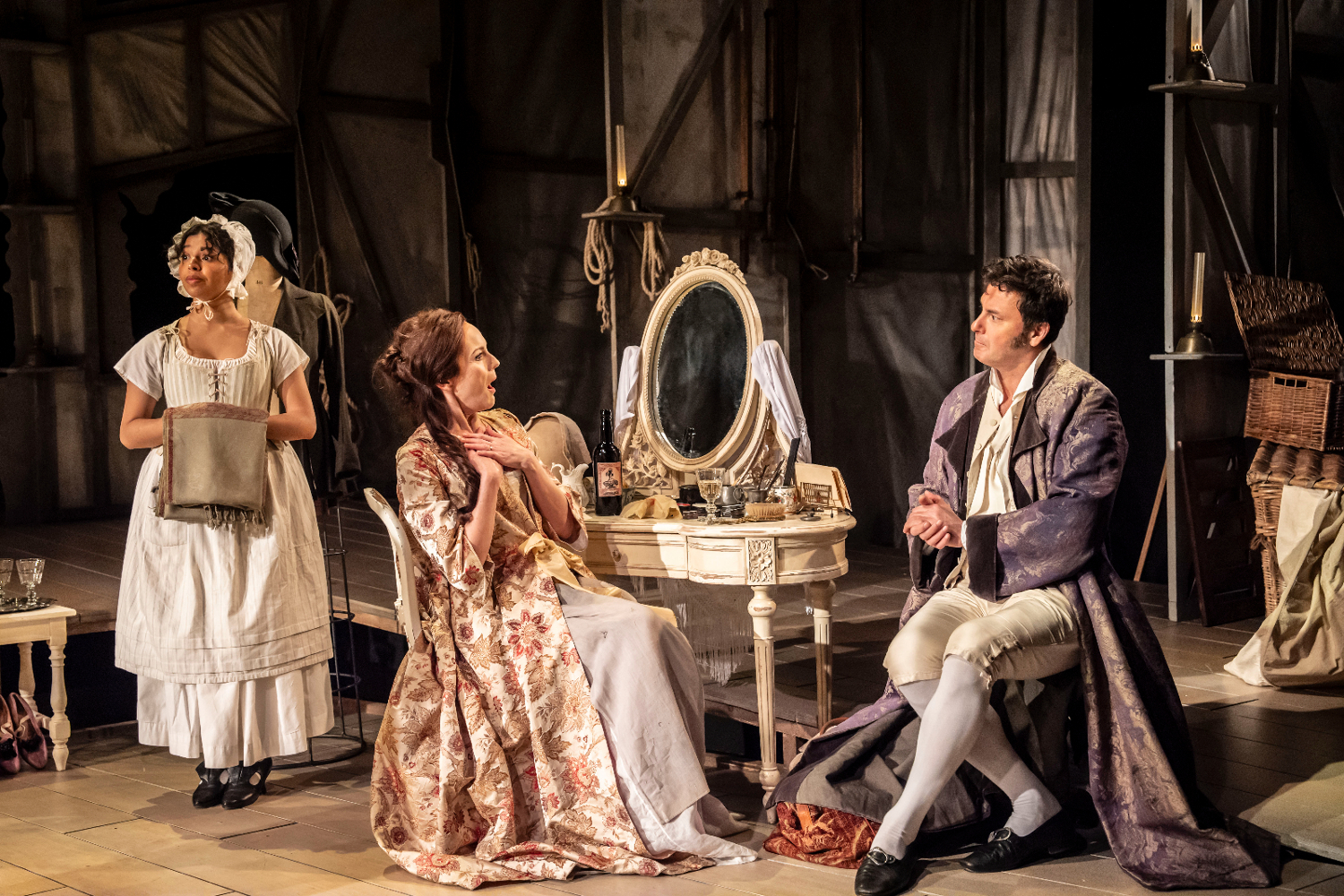There are genres of theatre that demand buy-in from the audience – musicals, opera and the daddy of them all, pantomime. The usual entry price to the house, the suspension of disbelief, requires supplementing with an active desire to meet the production halfway. So it is with comedy. Crudely put, we could all sit there like Mount Rushmore if we wanted to, but what good would that do?
April De Angelis’s new play makes that demand and rolls in another: that we civilians take an interest in the in-jokes and squabbling of actors (yes, the dread word "luvvie" hove into sight on a couple of occasions). It's a conceit that can be done, as the decades long success of Michael Frayn’s Noises Off and Ben Elton’s screen-to-stage Shakespeare pastiche Upstart Crow attests, but the feeling persists that backstage shenanigans can only engage so far. De Angelis has been around long enough to know that and, with the inestimable assistance of the magnificent Rachael Stirling (pictured below with Anushka Chakravarti and Dominic Rowan), buttresses this uneven gagfest with fascinating character study.
The eponymous Mrs Siddons was the leading actress of the late 18th century London, one part Emma Stone, one part Kim Kardashian and one part Katie Price. She was a popular and critical success, a proto-celebrity and a target for condemnation for putting a career ahead of both her children and her marriage to a bloodsucking husband. She is, to use the deathless phrase, a relatable person.
We meet her first on stage playing yet another tragic woman, a life ruined by feckless men and society’s infinite capacity to judge and condemn. She faints, as it’s all too close to home, her having lost a teenage daughter just two weeks prior, deaths of children being so much more common then, her grieving pushed aside by the need to make money to survive. Hard times fashion tough cookies – but there is a limit.
She gets short shrift from her brother, Philip Kemble, whose interest in her is motivated more by his business as the theatre's manager (she is his meal ticket) than by sibling sympathy. He is just the first of a succession of men who want to screw her, literally or metaphorically, whom she resists with almost superhuman fortitude. If you think making it as a woman on your own terms is a big ask now, try 1790s London in fear of importing revolution from Paris. The comedy comes from two main sources. Ms S, as Mrs S, delivers wisecrack after wisecrack, her sharp wit and keen perception of human fallibility skewering the fools who surround her. Stirling has form for this kind of performance and navigates the narrow path between smart and smartarse with such winning aplomb that one can hardly imagine another actress in the role. She justifies a trip to the box office alone.
The comedy comes from two main sources. Ms S, as Mrs S, delivers wisecrack after wisecrack, her sharp wit and keen perception of human fallibility skewering the fools who surround her. Stirling has form for this kind of performance and navigates the narrow path between smart and smartarse with such winning aplomb that one can hardly imagine another actress in the role. She justifies a trip to the box office alone.
The other source of laughs, which make up in frequency what they lack in LOL volume, come from a succession of broadly played male characters. Dominic Rowan goes full Ernie Wise in a "play what I wrote", as Kemble, a terrible actor whose pomposity only increases off-stage, as he is gripped by an inferiority complex in the shadow of his elder sister’s talent. Gareth Snook has a lot of fun doubling as a lascivious portrait painter and a fawning critic (more theatrical in-jokes), while The Censor is happy to leave his licensing responsibilities to his wife, Sadie Shimmin capturing her love-hate relationship with the power of Mrs Siddons to provoke audiences to challenge or accept the status quo.
The women carry the emotional heft of the play, the vectors of its legitimate, if somewhat heavy-handed, message about the persistence of the patriarchy.
Anushka Chakravarti’s Patti is the Barnsley girl down in The Smoke to avoid a deadend marriage, who is part-maid, part-confidante to Mrs Siddons, an example of how few opportunities there were (and by extension, are) for bright, working-class girls without connections. It’s an underwritten part that Chakravarti does well to make much of at all, especially in an awkward #MeToo incident that seems to sit outside the main narrative of the drama.
Eva Feiler has more to work with both as the would-be playwright, Joanna Baillie, who is championed by Mrs Siddons and whose play succeeds on opening night but closes a day later when her (female) identity is revealed. Doubling, she plays Clara, locked up in an institution for refusing to submit entirely to her husband’s wishes, she loses everything but, emboldened by Siddons, escapes to live triumphantly as an outlaw, the only life available to her.
But director, Anna Mackmin, wisely allows the star actress playing the superstar actress to be front and centre for pretty much every moment of the two-hour runtime. Stirling shows (in a production that isn’t shy to do a lot of telling) how Siddons’ talent flowers but is circumscribed by lesser men, much lesser men. She rails against theatre’s lack of interest in women over the age of 25, in its narrowness of subject matter, its control residing in too few hands.
Even as we hear the message and reflect that we’re watching a new play written by a woman, directed by a woman and starring a woman, we know that 225 years on, these issues are still a matter for remark. The Siddons, Pattis and Joannas still walk amongst us, often as unrecognised and ghettoised today as they were back then.















Add comment